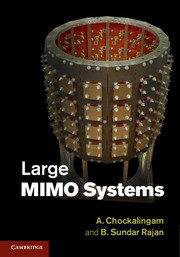Book contents
- Frontmatter
- Dedication
- Contents
- Preface
- Acknowledgments
- Abbreviations
- Notation
- 1 Introduction
- 2 Large MIMO systems
- 3 MIMO encoding
- 4 MIMO detection
- 5 Detection based on local search
- 6 Detection based on probabilistic data association (PDA)
- 7 Detection/decoding based on message passing on graphical models
- 8 Detection based on MCMC techniques
- 9 Channel estimation in large MIMO systems
- 10 Precoding in large MIMO systems
- 11 MIMO channel models
- 12 Large MIMO testbeds
- Author index
- Subject index
- References
6 - Detection based on probabilistic data association (PDA)
Published online by Cambridge University Press: 18 December 2013
- Frontmatter
- Dedication
- Contents
- Preface
- Acknowledgments
- Abbreviations
- Notation
- 1 Introduction
- 2 Large MIMO systems
- 3 MIMO encoding
- 4 MIMO detection
- 5 Detection based on local search
- 6 Detection based on probabilistic data association (PDA)
- 7 Detection/decoding based on message passing on graphical models
- 8 Detection based on MCMC techniques
- 9 Channel estimation in large MIMO systems
- 10 Precoding in large MIMO systems
- 11 MIMO channel models
- 12 Large MIMO testbeds
- Author index
- Subject index
- References
Summary
Algorithms based on PDA can be employed for low complexity MIMO detection. PDA was originally developed for target tracking in remote sensing applications like radar, sonar, etc. [1]–[3]. In these applications, tracking a target (potentially a non-cooperative hostile target) or multiple targets is of interest. Signals from such targets of interest can be weak. To detect such weak signals, the detection threshold has to be lowered, which may lead to the detection of other background signals (e.g., signals from other unwanted targets) and sensor noise, yielding spurious measurements which are clutter or false-alarm originated. Target tracking loss may result when such spurious measurements are used in a tracking filter (e.g., a Kalman filter). The selection of which measurements to use to update the estimate of the target state for tracking is known as data association. Data association uncertainty arises from ambiguity as to which measurements are appropriate for use in the tracking filter. Tracking of targets of interest in the presence of data association uncertainty has been studied extensively. The goal is to obtain accurate estimates of the target state and the associated uncertainty.
Optimal estimation of the target state involves recursive computation of the conditional probability density function (pdf) of the state, given all the information available, namely, (i) the prior information about the initial state, (ii) the intervening known inputs, and (iii) the set of measurements up to that time.
Information
- Type
- Chapter
- Information
- Large MIMO Systems , pp. 110 - 122Publisher: Cambridge University PressPrint publication year: 2014
